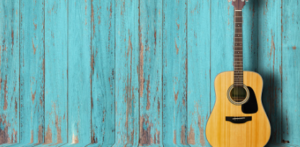There is an array of acoustic guitar strings on the market, each featuring different gauges, such as medium gauge acoustic guitar strings, alloys and materials, and coatings for protection and aesthetics.
Flatwound strings are a favourite choice among jazz musicians as they provide a smoother response and don’t generate as much string noise when bending notes. Plus, these sturdy strings will outlive even the toughest sessions!
Nylon
 Nylon strings produce a silky sound suitable for many genres of music and are much simpler to play than steel ones, making them great for beginners. There are various kinds of nylon guitar strings ranging from normal tension to higher tension versions, each with its distinctive sound and feel.
Nylon strings produce a silky sound suitable for many genres of music and are much simpler to play than steel ones, making them great for beginners. There are various kinds of nylon guitar strings ranging from normal tension to higher tension versions, each with its distinctive sound and feel.
String gauge is also important when selecting medium gauge acoustic guitar strings. Thicker strings generally produce louder, more resonant sounds but may be harder to play; in comparison, thinner strings may have less volume or resonance but may be easier for younger musicians. When selecting your ideal string gauge, consider your playing style and specific sound preferences.
Before the development of nylon strings, classical guitar treble strings were typically composed of the gut, sheep or cow intestine. Due to its organic material being susceptible to temperature and humidity changes, which caused strings to go out of tune more often; to address this issue, some guitarists use Nyl Gut strings, made from synthetic material that mimics the sound of gut strings.
Steel
Metal-wound guitar strings must be composed of metallic material to respond appropriately with pickups found on acoustic guitars, usually, steel strings coated in various metals for their tone and response. Different plating options can also be chosen to alter the tone and response characteristics of metal-wound strings – round wound being the standard, offering bright tones; flat-wound strings have darker undertones, while half-round strings fall somewhere between round and flat windings.
Brass or bronze strings (commonly called 80/20 bronze) can provide an outstanding blend of brightness and projection; however, their corrosion can significantly shorten string life. A more recent innovation – Phosphor bronze – provides a similar sound but with reduced brightness; adding phosphor to prevent corrosion increases longevity while offering similar sound qualities as brass strings.
Ernie Ball has also developed cobalt strings, which feature higher tonality for more precision and greater responsiveness to magnetic pickups than nickel strings, meaning deeper tones with increased response and responsiveness.
These medium gauge acoustic guitar strings are typically found on smaller-bodied guitars like parlour, 00, double-O, GS and folk models, which tend to feature thinner soundboards and lighter internal ribbing and require lower gauge strings compared to their dreadnought or jumbo counterparts. Fingerstyle guitarists may utilise such guitars for fingerstyle playing to achieve more delicate and complex sounds.
Phosphor Bronze
Although all acoustic guitar strings contain steel cores, their major variations come from their covers – usually metals such as brass (also known as 80/20 bronze), phosphor bronze or silk-and-steel composition strings (compound strings). Pure nickel-plated steel strings offer bright tones ideal for metal and rock music genres; however, they’re more susceptible to corrosion and, therefore, less desirable overall.
Phosphor bronze is an update to the original 80/20 copper/zinc alloy, adding a phosphor component and extending string life while offering some of its original brightness. An excellent choice for gigging acoustic guitarists looking to spend less time tuning and more time playing!
Aluminium Bronze
Ernie Ball acoustic guitar strings are crafted using a blend of copper and aluminium wrapped around Maraging Steel hex cores for optimal tone quality with better projection and clarity than traditional bronze strings. In addition, these Ernie Ball strings resist corrosion much better than other acoustic guitar strings on the market today.
Phosphor bronze strings offer a slightly warmer sound than their 80/20 counterparts and are frequently chosen due to their ability to retain brilliance after playing for some time. Their higher phosphorus content gives more tonal softness, making them ideal for folk or country-playing styles.
Round-core acoustic guitar strings often boast deeper, more prominent low notes than their hexagon-core counterparts, making them the go-to choice for string players who desire their bass notes to resonate truly. Unfortunately, round cores tend to be less durable.
